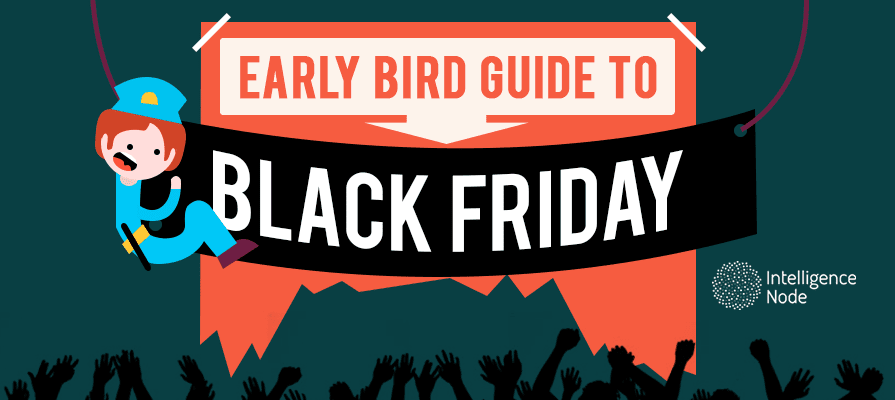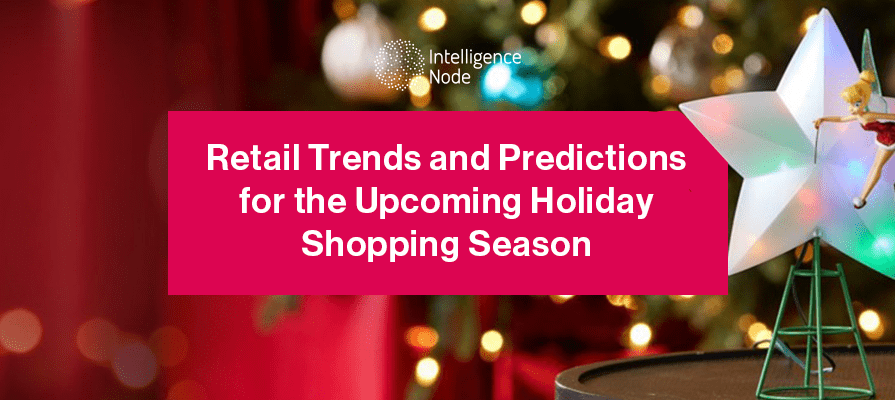Since 2017 has been a year of retail reinvention and consolidation, expect intense competition for consumer wallets this holiday season, which is coming up fast. There’s no time to waste: Now is the time to finalize your Black Friday 2018 strategy because this is the most important (and profitable) time of year for online businesses.
Confidently prepare for this massive global shopping extravaganza by applying the tips in this guide to outmaneuver retail giants by making smart, data-driven decisions to avoid risk, and maximize your online traffic and sales.
Black Friday is a bigger deal than ever
Although Black Friday falls on November 24 this year, the event has evolved to extend far beyond one single day. Consumers now expect pre-Black Friday sales and “[m]arkdowns start as early as September 1, at 16% full-price, then creep up to a discount of 46% before November 1, and 56% after November 1” at early holiday sales events.[i]
Just how big is Black Friday?
In 2016, the shopping event surpassed experts’ estimates, with total sales of $3.3 billion, representing 22% percent growth, year-over-year. Mobile accounted for $1.2 billion, a 33% increase from the previous year. Amazon’s mobile orders on Thanksgiving topped 2015’s Cyber Monday. In addition, more than 70% of Walmart’s website traffic on Thanksgiving was mobile, and 60% of the retailer’s Black Friday online orders came from mobile devices.[ii]
Whether consumers seek electronics, cosmetics, or apparel, they love to score great deals on bestselling products. They increasingly turn to online shopping to avoid the hysteria of crowded shopping malls and they’re shopping online earlier than before.
Here are several ways you can prepare now to maximize your Black Friday 2018 online sales:
Get the (holiday sales) party started:
Supersize your Black Friday sales with your own Cyber November campaign. Jumpstart your Black Friday sales by announcing online discounts and promotions early in November to get on shoppers’ radars before your rivals do.
Shoppers are less willing to wait if they have the option to get their shopping started. In 2015, 57% of consumers already had started their holiday buying by early November; the National Retail Federation reports 40% of shoppers had started looking for gifts by Halloween.[iii]
These stats explain why, last November, Amazon began 35 consecutive days of “Black Friday” bargains, to give shoppers low prices before and after Thanksgiving.[iv] Other retailers that got a jump start on sales include Walmart, Macy’s, and Target.
Get in their face:
Showcase your best new products on your eCommerce homepage to speed up product discovery. Also emphasize the most popular, wished-for, and well-reviewed products in your online assortment, which consumers are more likely to buy, based on sales histories, and sales data for products that are exact matches and similar matches to your offerings. Last year, Sephora’s Black Friday eCommerce campaign featured a wide assortment of exclusive sales, starting with select products the retailer showcased on the homepage.

Check out the competitors:
Reviewing competitive assortment data can let you know your rivals’ best selling products. Compare your assortment to theirs to determine whether you have any significant product gaps – and which products can help you stand out and sell. Identify which of your products are unique and exclusive, as they can give you a competitive advantage and loyalty. Use your marketing campaigns to show how you’re different, and how you compare in popular categories. Walmart matched some of its competitors’ best Black Friday deals on electronics and toys a full week early with a pre-Black Friday sale. Sale items included Samsung TVs and an iPad, plus the retailer threw in a $100 Walmart gift card.[v]
Make sure the price is right:
For more competitive insights, use data to understand your rivals’ pricing and discount strategies – and how your pricing strategy compares. You may need to adjust it before Black Friday to sell more while protecting your margins.
In recent years, retailers have used dynamic pricing, which means they set flexible prices based on current market demands by constantly monitoring competitive. Why do retailers use dynamic pricing? To combat consumer price sensitivity, 57% of Forbes survey participants say dynamic pricing is more effective than price matching.[vi]
Exclusive Report: Can Dynamic Pricing Save Retailers From the Discounting Drug?
On Black Friday, Amazon changes its prices of highly competitive items multiple times per day, and the pattern of those price changes sometimes matches the doorbuster pricing of store-based retailers, where between 8am-10am ET, for example, the price is 25% off, and then rises to only 10% off after 10 am.
Think mobile first:
Ensure you have an attractive, responsive web design that adapts to the different needs of consumers using tablets and smartphones. Recent figures show mobile accounted for 40 percent of holiday sales, with 29 percent from smartphones, and 11 percent for tablets.[vii] In a sophisticated mobile marketing campaign, IKEA used a mobile app that uses augmented reality to help consumers imagine what a piece of furniture would look like in their home and ensure it fits their space. More than 6 million users installed IKEA’s app, it was the number one download and it engaged consumers nearly three times as long as the retailer’s printed catalog.[viii]
Get shoppers to think “Yes!”:
Review your eCommerce website analytics to know which webpages make shopping cart abandonment most likely, which products shoppers browse but do not buy, and investigate how you can make the user experience more positive and appealing to boost conversions. It also offers an easy, hassle-free returns policy to boost consumer confidence and their willingness to buy online. Nordstrom, Kohl’s, and REI are renowned for their industry-leading, hassle-free returns policies.[ix]
Prevent out-of-stocks:
Ensure your warehouses are stocked with all your bestselling products. Your forecasts should be based on historic sales trends, as well as real-time market insights to know what shoppers want now.
Popular products during the holiday season are electronics, smartwatches, and toys; however, many companies faced out-of-stock issues and retail storage issues. In fact, products under $300 were 20% more likely to be out-of-stock.[x]
According to a report by the Wall Street Journal, on Black Friday, Toys “R” Us’ website was in stock 62% of the time on the 100 top-selling toys. While that’s below the 95% recommended service level due to it being peak sales season, it’s on par with many other retailers. Wal-Mart Stores had a 63% in-stock rate, and Target had a 51% rate.[xi][xii]
Make online payment easy:
A seamless, fast payment process will encourage more online shoppers to complete their purchases. Also, since online shoppers can come from anywhere, consider offering global payment options that extend beyond Visa and Mastercard, including Apple Pay, WeChat Pay, and Alipay, which are increasingly popular among affluent Asian shoppers in particular. Luxury apparel retailers Coach and Burberry offer WeChat as a payment option, as this social network is massive in China and includes integrated marketplaces for online shopping.[xiii]
Go the extra mile:
Online shoppers now expect fast and free shipping on major shopping days like Cyber Monday and they expect the option of the next day, or even same-day, delivery, regardless of the delivery method they choose. Last year, Best Buy offered free shipping with no minimum purchase requirement.[xiv]
Keep the buzz going:
Just because Black Friday is in November doesn’t mean shoppers are done all their shopping. (Some people start on Christmas Eve!) Extend your sales period into December, as shoppers often still need last-minute holiday gifts, discounts, and fast delivery ahead of the Christmas rush. To maximize sales excitement last year, apparel retailer Farfetch offered online sales from Thanksgiving Day until the end of the calendar year.[xv] Also, Amazon offered a new deal every five minutes (!) between Black Friday and December 22.[xvi]
End the year strong. Start planning now by apply proven tips for a successful Black Friday sales strategy. Using these tips can help you outsmart the big guys, like Amazon, Walmart, and Target, so you stay relevant and gain omnichannel flexibility you need to succeed in online retail in time for Black Friday.
We’ll be up looking at the data while you’re chasing bigger targets. Beat them at their research.
[i] Rae, Haniya. Bricks Versus Clicks: The Black Friday And Cyber Monday Breakdown. Forbes. November 25, 2016.
[ii] Perez, Sarah. Black Friday online sales to hit a record-breaking $3 billion, over $1 billion from mobile. TechCrunch. November 25, 2016.
[iii] Popomaronis, Tom. 35 Days Of Deals: Amazon Just Turned Black Friday Into Black Month. Forbes. November 21, 2016.
[iv] Ibid.
[v] Walmart really doesn’t want you to shop at Best Buy or Target this Black Friday. Consumer Reports. November 19, 2017.
[vi] Baird, Nikki. Dynamic Pricing: When Should Retailers Bother? Forbes. April 18, 2017.
[vii] Perez, Sarah. Black Friday online sales to hit a record-breaking $3 billion, over $1 billion from mobile. TechCrunch. November 25, 2016.
[viii] Lanzarini, Aurore. Mobile Marketing Campaign – IKEA Catalogue App. Imaginarium. November 25, 2016.
[ix] Kukura, Joe. 7 Stores With the Best Return Policies. NerdWallet. December 8, 2016.
[x] Black Friday round-up: US shoppers spend $3.34bn online but high street sales fall 10%. Net Imperative. November 28, 2016.
[xi] Lim, Vera. Toys“R”Us: How out-of-stock situations are killing the toy giant. Trade Gecko. January 22, 2016.
[xii] How Out-of-Stock Inventory is Killing Toys’‘R’‘Us. Supply Chain 24/7. February 10, 2016.
[xiii] Williams, Gemma A. WeChat Stores Are China’s Latest Luxury Craze. Business of Fashion. June 5, 2017.
[xiv] Dengler, Phil. Best Buy To Offer Free Shipping With No Minimum Order Size for The 2016 Holiday Season. BestBlackFriday.com. October 25, 2016.
[xv] Hindmarch, Anya. Farfetch Black Friday Sale Includes Bags Up To 50% Off. Spotted Fashion. November 25, 2017.
[xvi] Ibid.






